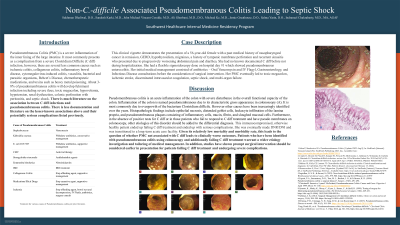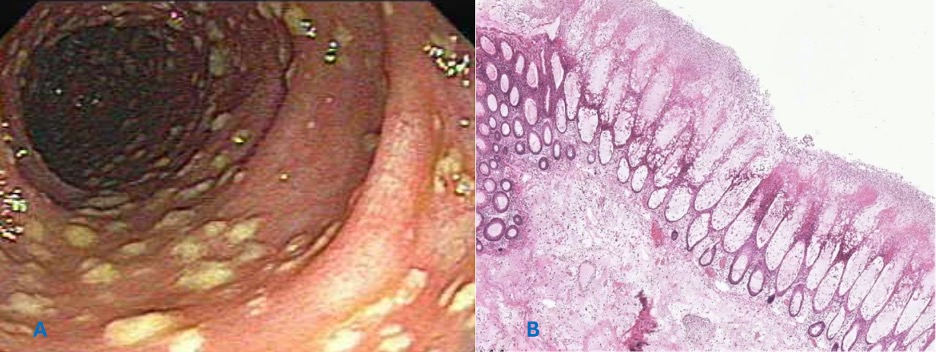Monday Poster Session
Category: Colon
P2097 - Non C. difficile-Associated Pseudomembranous Colitis Leading to Septic Shock
Monday, October 28, 2024
10:30 AM - 4:00 PM ET
Location: Exhibit Hall E

Has Audio
- SD
Sukhman Dhaliwal, DO
Southwest Healthcare MEC
Temecula, CA
Presenting Author(s)
Sukhman Dhaliwal, DO, Sandesh Karki, MD, John MIchael Vincent Coralde, MD, Ali Ghorbani, MD, Michael Ke, MD, Jamie Greathouse, DO, Salma Yasin, DO, Indraneel Chakrabarty, MD, MA
Southwest Healthcare MEC, Temecula, CA
Introduction: Pseudomembranous Colitis (PMC) is a severe inflammation of the inner lining of the large intestine. It most commonly presents as a complication from a severe Clostridium Difficile (C diff) infection, however, there are several less common causes such as ischemic colitis, collagenous colitis, inflammatory bowel disease, cytomegalovirus-induced colitis, vasculitis, bacterial and parasitic organisms, Behcet’s Disease, chemotherapeutic medications, and toxins such as heavy metal poisoning. About 3-8% of pseudomembranous colitis will develop fulminant infection including severe ileus, toxic megacolon, hypovolemia, hypotension, renal dysfunction, colonic perforation with peritonitis, and septic shock. There is much literature on the association between C diff infections and pseudomembranous colitis. There is less documentation and literature on the lesser-known associations above and their potentially serious complications listed previously.
Case Description/Methods: This clinical vignette demonstrates the presentation of a 56-year-old female with a past medical history of nasopharyngeal cancer in remission, GERD, hypothyroidism, migraines, a history of tympanic membrane perforation and recurrent sinusitis who presented due to progressively worsening abdominal pain and diarrhea. She had no known documented C diff before nor during hospitalization. She had a flexible sigmoidoscopy done on hospital day #1 which showed pseudomembranous enterocolitis. Her initial medical management consisted of antibiotics, Gastroenterology, and Infectious Disease consultations before the consideration of surgical intervention. Her PMC eventually led to toxic megacolon, ischemic stroke, disseminated intravascular coagulation, septic shock, and multi-organ failure.
Discussion: This immunocompromised, otherwise healthy patient ended up failing C diff treatment and ended up with serious complications. She was eventually made DNR/DNI and was transitioned to a long-term acute care facility. Given its relatively low mortality and morbidity rate, this leads to the question of whether PMC not associated with C diff leads to clinically worse outcomes. Patients who have been identified with pseudomembranous colitis using colonoscopy and additionally failing C diff treatment warrant a wider etiology investigation and tailoring of medical management. In addition, studies have shown prompt surgical intervention should be considered earlier in presentation for patients failing C diff treatment and undergoing severe complications.

Note: The table for this abstract can be viewed in the ePoster Gallery section of the ACG 2024 ePoster Site or in The American Journal of Gastroenterology's abstract supplement issue, both of which will be available starting October 27, 2024.
Disclosures:
Sukhman Dhaliwal, DO, Sandesh Karki, MD, John MIchael Vincent Coralde, MD, Ali Ghorbani, MD, Michael Ke, MD, Jamie Greathouse, DO, Salma Yasin, DO, Indraneel Chakrabarty, MD, MA. P2097 - Non <i>C. difficile</i>-Associated Pseudomembranous Colitis Leading to Septic Shock, ACG 2024 Annual Scientific Meeting Abstracts. Philadelphia, PA: American College of Gastroenterology.
Southwest Healthcare MEC, Temecula, CA
Introduction: Pseudomembranous Colitis (PMC) is a severe inflammation of the inner lining of the large intestine. It most commonly presents as a complication from a severe Clostridium Difficile (C diff) infection, however, there are several less common causes such as ischemic colitis, collagenous colitis, inflammatory bowel disease, cytomegalovirus-induced colitis, vasculitis, bacterial and parasitic organisms, Behcet’s Disease, chemotherapeutic medications, and toxins such as heavy metal poisoning. About 3-8% of pseudomembranous colitis will develop fulminant infection including severe ileus, toxic megacolon, hypovolemia, hypotension, renal dysfunction, colonic perforation with peritonitis, and septic shock. There is much literature on the association between C diff infections and pseudomembranous colitis. There is less documentation and literature on the lesser-known associations above and their potentially serious complications listed previously.
Case Description/Methods: This clinical vignette demonstrates the presentation of a 56-year-old female with a past medical history of nasopharyngeal cancer in remission, GERD, hypothyroidism, migraines, a history of tympanic membrane perforation and recurrent sinusitis who presented due to progressively worsening abdominal pain and diarrhea. She had no known documented C diff before nor during hospitalization. She had a flexible sigmoidoscopy done on hospital day #1 which showed pseudomembranous enterocolitis. Her initial medical management consisted of antibiotics, Gastroenterology, and Infectious Disease consultations before the consideration of surgical intervention. Her PMC eventually led to toxic megacolon, ischemic stroke, disseminated intravascular coagulation, septic shock, and multi-organ failure.
Discussion: This immunocompromised, otherwise healthy patient ended up failing C diff treatment and ended up with serious complications. She was eventually made DNR/DNI and was transitioned to a long-term acute care facility. Given its relatively low mortality and morbidity rate, this leads to the question of whether PMC not associated with C diff leads to clinically worse outcomes. Patients who have been identified with pseudomembranous colitis using colonoscopy and additionally failing C diff treatment warrant a wider etiology investigation and tailoring of medical management. In addition, studies have shown prompt surgical intervention should be considered earlier in presentation for patients failing C diff treatment and undergoing severe complications.

Figure: Gross appearance of Pseudomembranous colitis seen during colonoscopy (A), and histopathology of the disease under light microscopy (B).
Note: The table for this abstract can be viewed in the ePoster Gallery section of the ACG 2024 ePoster Site or in The American Journal of Gastroenterology's abstract supplement issue, both of which will be available starting October 27, 2024.
Disclosures:
Sukhman Dhaliwal indicated no relevant financial relationships.
Sandesh Karki indicated no relevant financial relationships.
John MIchael Vincent Coralde indicated no relevant financial relationships.
Ali Ghorbani indicated no relevant financial relationships.
Michael Ke indicated no relevant financial relationships.
Jamie Greathouse indicated no relevant financial relationships.
Salma Yasin indicated no relevant financial relationships.
Indraneel Chakrabarty indicated no relevant financial relationships.
Sukhman Dhaliwal, DO, Sandesh Karki, MD, John MIchael Vincent Coralde, MD, Ali Ghorbani, MD, Michael Ke, MD, Jamie Greathouse, DO, Salma Yasin, DO, Indraneel Chakrabarty, MD, MA. P2097 - Non <i>C. difficile</i>-Associated Pseudomembranous Colitis Leading to Septic Shock, ACG 2024 Annual Scientific Meeting Abstracts. Philadelphia, PA: American College of Gastroenterology.
